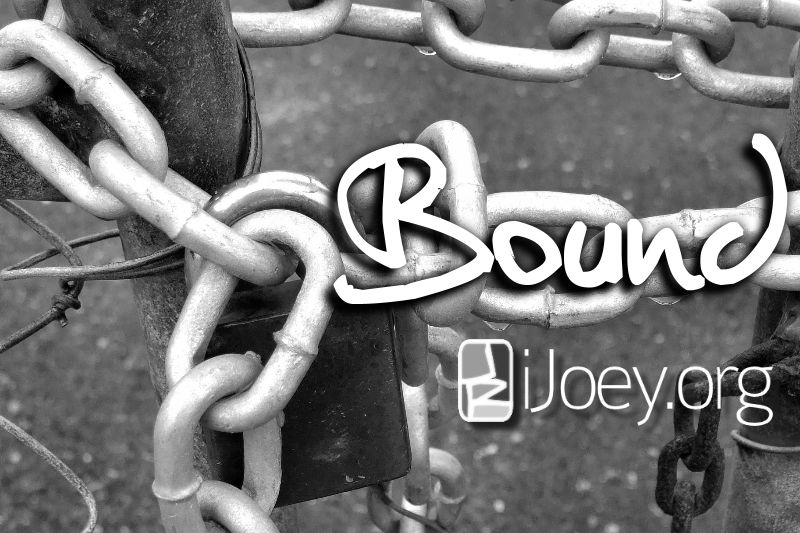In past posts, I’ve noted that the heart of sin is selfishness, while the heart of Christian discipleship (and that of many other world religions in their purest form) is selflessness. Selfishness is often thought of as retaining for oneself things that would be best shared with others. What can be more selfish than removing the free will of another person? What can be more violent than reducing another person’s liberty to the modes we choose to grant them?
Dangers of the Collective Will

Jerome Relocation Center, Denson, Arkansas. The Arkansas rainy season, and this young resident of the Jerome Center dons rubber boots and carries a parasol. The mud makes the trip to and from school a little difficult. (Japanese American interment camp during World War II.) (Photo credit: Wikipedia)
In a democracy, there is a danger of turning the government into an instrument of our collective will rather than the preserver and protector of our collective freedoms. Should we not prevent the government from enacting and enforcing an oppressive and prejudiced collective will? Consider carefully the fact that our national collective will once bent the government to enact laws making slavery legal. Later, that same will forbade former slaves the vote. Our collective will interred thousands of Japanese-Americans after Pearl Harbor. Our collective will continues to enforce laws that prevent the marriage of same-sex couples.
Under the Constitution, do we have the right to inflict our will upon those persons even if we believe it to be a divine tenet? Do we have the capability of forcing others to live under our belief system? The same presumption by devout Muslims generates outrage on an unprecedented scale. The Pope recently stated that conscientious objection was the right of every person – no argument here. But that conscientious objection should be very clearly defined as “refusing to participate in the institution performing acts with which the objector disagrees.” That means leaving the system, not staying to prevent the participation of others.
In our system of government, conscientious objection can spur the review and revision of laws, but should never become a law unto itself. Otherwise, we might find ourselves pulled over by a faithful disciple of some made-up religion who feels that we should not be allowed to use left turn signals because it offends Lord Xenon. Personally, I think if Lord Xenon’s disciple finds left turn signals to be unholy, he shouldn’t use one. He’ll fit right in with the majority of urban drivers in this country. But I digress….
Free Will
Our beliefs as United Methodist include the doctrine of free will. It’s actually a key Article in our Articles of Faith, the chief expression of our United Methodist interpretation of Scripture. Standing in at number eight (right behind Original Sin and our understanding of the Trinity and each person thereof), it’s pretty high on the list. What does that mean? It means that faith is a choice. It means “God didn’t make me think this way or act this way; I’m responsible for my own decisions.” Faith is a choice. So is it real faith if it is merely enforced law? Are we creating a Christian nation if we are merely enforcing some jackboot idea of how people should behave?
Christian Freedom

Franklin Delano Roosevelt’s “Four Freedoms” at the Franklin Delano Roosevelt Memorial in Washington D.C., USA. Taken 4/4/2005 by Daniel Bjorndahl.
Jesus sought to bind no one. His ministry stood in defiance of the laws of state. His ministry stood in defiance of the religious laws of his own culture. One should carefully note that his major disagreement was with codes, rules, and laws that had been subverted to the use of the powerful at the expense of the weak and the impoverished. In fact, it was that oppression that drove the desire of the people to anticipate the Messiah. Everyone in Israel, from the ruling monarch down to the blind beggar felt oppressed. The only difference was in the degree. The monarch was unable to rule in name only, but enjoyed the benefits of royalty and wealth. The same could not be said of the beggar.
To be sure, the Jewish people of Christ’s time expected something different than what they saw in Jesus. The zealots expected a general who would lead them to military power. The priestly caste expected a prophet who could lead them to renewed religious authority. Everyone hoped for a king who would re-establish political power allowing for a return to greatness in the international community and prosperity unseen since the days of Solomon.
But they were disappointed. Jesus did not inflict his will in any manner that the secular or even the religious world anticipated. As a zealot, Christ failed, for he did not incite the crowds to violence. As a priest in the ordinary sense, he failed, for not only did he eschew the priestly role, he upset the business of the Temple and ran people from the Temple courts with a whip of cords. As a general, he was an utter failure, for he never commanded an army and eventually told Peter to put away the sword. And as a king, in the way the world views kings, he was an utter failure, for he was deposed before he could get anywhere near a throne; the only crown he wore was plaited of thorny vines and used to mock him. His death on the Cross even created problems for those who interpreted Scripture properly. He was cursed just for “hanging on the tree” according to his own Jewish religious beliefs.
[tweetthis]Jesus did not come to inflict his will. He came to offer himself.[/tweetthis]
Jesus did not come to inflict his will. He came to offer himself. When the Church forgets this, the Church begins to seek ways to control and prevent. When the churches forget this, they begin to cull and separate, to judge, and to exclude. And when those voices combine in a democracy like we have in the USA, we find laws that establish religious beliefs for people who do not share them.
Imposing Christianity
We will not make disciples by binding the masses with “Christian laws.” Free Will comes back into focus almost immediately. Laws may prevent me from sinning in word by denying me the liberty to do as I feel is right, but there is no way to prevent the act or the thought — though there are those who seek to monitor and patrol the thinking and writing of those who disagree. Our shame is that we attempt to do so while decrying sharia law. This discrepancy aptly illustrates the excuse that we are right to do so because our religious beliefs are right and true while theirs are wrong and false.
[tweetthis]We will not make disciples by binding the masses with “Christian laws.”[/tweetthis]
Obviously, not all USAmericans are Christians. Those who do identify as Christian are not all of the same stripe. Shall we accept the Christian legal strictures of Mike Huckabee over the covenant of Christianity upheld by David Koresh? As Christians, we might identify more with the former than the latter, but we would chafe under the differences presented by either to our own set of beliefs. We make assumptions based on the false notion that “everyone thinks like us.” Carl Jung said, “The shoe that fits one person pinches another; there is no recipe for living that suits all cases.”
We may disagree with the verity of another’s religious beliefs, but we are a people who value freedom. But do we value freedom enough to let others think and act as they will when it does not impinge upon our own beliefs and freedoms? We must protect ourselves and each other from any religion that seeks to foist its tenets upon others. That must include our own faith.
Adherents, Not Prisoners
Even if we believe in freedom, we have to address the fact that the very word “religion” finds its root in the concept of “binding.” The root ligios is the same root found in the word “ligature.” But, according to United Methodist belief, that binding is one that must be undertaken by the individual.
So let us not confuse the tenets of religion with the selfish desire of some who seek to impose it.
[tweetthis]Christians should not seek to bend the will of those around us. We should seek instead to engage it.[/tweetthis]
Christians should not seek to bend the will of those around us. We should seek instead to engage it. Our faith is one of sacrament and gift, of offering and sharing. Such a method is much more difficult, for it requires us to release our power. For those with much authority, whether personal power or the power of residing in the privileged majority, such a sacrifice can be overwhelming. But the example of Christ requires no less than surrendering our political, earthly power. We must never take up the cloak of the State and call it Christ when it would be more aptly named Pilate.













Recent Comments